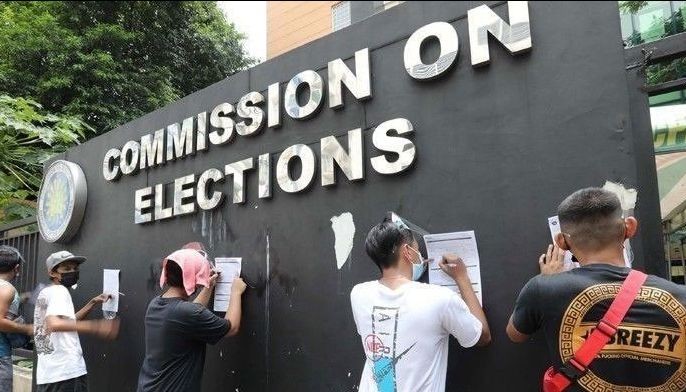MANILA, Philippines — The Commission on Elections has suspended its Memorandum of Agreement with online news site Rappler after the Office of the Solicitor General filed a petition at the Supreme Court questioning its constitutionality.
Comelec Acting Chairperson Socorro Inting on Tuesday issued a memorandum stating that the poll body is suspending the MOA until the petition has been resolved.
Related Stories
"Given the allegations against Rappler and the subsequent filing of the Petition with the SC, it is judicious for the Commission to hold in abeyance the implementation of the provisions of the MOA until the issues are settled and/or the decision of the court is rendered," Inting said.
A copy of the memorandum was first posted by SMNI Inc, which also livestreamed the OSG filing.
This comes just a day after Solicitor General Jose Calida, making good on his statement, asked the SC to void the MOA between Comelec, which is its statutory client, and Rappler for supposedly "being violative of the Constitution and other laws, not to mention its being onerous to the Government and the Republic."
A copy of the petition has yet to be made public, but the OSG’s statement said it is their position that "the nation’s future is at risk for the Comelec erroneously chose to partner with a foreign-controlled media company whose license was duly revoked in 2018 and dangerously allowed this pseudo media company to proactively influence the 2022 election."
"Given the urgency of the situation and transcendental importance of the matters of public interest, [Calida] urges the highest court to exercise its constitutional mandate to stop the numerous violations of the 1987 Constitution and other laws in the execution of the Rappler-Comelec MOA and to immediately issue a temporary restraining order," it said in a statement.
Issues in petition
Prior to the filing of Calida’s petition, the OSG wrote to the Comelec in February, urging it to scrap the MOA or they would seek court action on it.
Among the issues Calida raised were Comelec's supposed undue delegation of the Comelec’s authority to the online news site; Rappler’s supposed violation of law; the company’s alleged record of biased information reportage and violation of policy to be fully independent from foreign interference.
These were the same issues that Calida cited in the OSG’s petition to the SC, according to their statement.
Inting said that they wrote to the OSG on March 4 and asked it to submit credible evidence for the Commission’s evaluation.
But the OSG on March 7 followed through on its warning.
Inting said: "All actions in connection with the MOA shall be deferred including coordination between the Commission and Rappler on matters of the MOA."
Fact-checking
Calida’s petition argued that the MOA "authorized Rappler to alert Comelec on any election-related posts on social media and with the sole discretion to determine what it deems ‘false, misleading and harmful information.’"
"Such power granted by Comelec in favor of Rappler clearly constitutes prior restraint on freedom of speech and of expression,” he added in the statement.
In Chavez v. Gonzales, the Supreme Court referred to prior restraint as “official governmental restrictions on the press or other forms of expression in advance of actual publication or dissemination.”
Essentially, prior restraint means government restriction on the press before publication.
But Calida said: "Rappler cannot act as king, priest, and noble — all at the same time — forcibly feeding the Filipinos what information it thinks is a fact."
Philippine media organizations, the academe and non-governmental groups have vowed to increase and amplify fact-checking efforts for the 2022 national elections.
Readers can verify the content of fact checks on their own since sources and bases for the fact-check ratings are included in the articles themselves.


